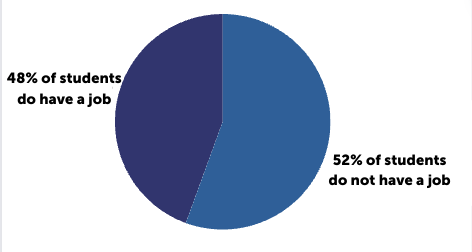How Seasonal Changes Affect Mental Health

A snowman depicting the winter blues
March 19, 2021
When the sun starts to set earlier and the temperatures drop, mental health can be greatly impacted, especially in the current isolated environment. During this challenging time, it is important that the Woodgrove community is aware of the signs of Seasonal Affective Disorder and how to support each other.
Seasonal Affective Disorder, or SAD, is a mental health condition that is classified as a form of depression. It affects around 6% of the total population and tends to be more prevalent in females. SAD is characterized with symptoms of depression and unexplained fatigue in the winter months. According to Heidi Buckner, Woodgrove’s school psychologist, “People with this condition experience depressed moods, usually during the fall and winter months when there is less sunlight and usually improve when spring arrives. It is thought to be caused by a chemical imbalance caused by shorter daylight hours and less sunlight in the winter months.”

This disorder can have severe symptoms that interfere with daily life. Some symptoms may include low energy, difficulty concentrating, changes in eating, sleeping, and mood, and lack of enjoyment.
For people struggling with Seasonal Affective Disorder, try using, “General coping strategies to help with a depressed mood or general stress,” and focus on “tapping into your sources of strength,” says Buckner. She suggests coping skills such as, “Engaging in acts of generosity; participating in healthy activities like sports, reading, listening to music, coloring, etc.; exploring spirituality like mindfulness, yoga, organized religion, or just being one with nature; and increase healthy behaviors such as getting a good night’s sleep, drinking water, and eating a healthy diet.”
Distance learning, especially in the winter months, has taken a toll on many students’ mental health. “It can be frustrating knowing that you’re missing out on things that you would be doing if things were normal,” says Woodgrove Sophomore Lindsay Bogle.
During these winter months, it’s important to reach out to your friends and loved ones to check on them. When asked what she would say to someone struggling right now, Bogle says, “Keep pushing through, everyone is here for you.”
Woodgrove has made an effort over the years to continue conversations about mental health. The school has made changes including the creation of a We’re All Human Club and has promoted awareness surrounding mental health. Junior Grace Rand says, “I think that mental health should be a much bigger part of not only Woodgrove, but all schools.”
Resources:
Help is available. If you need support during this time here is a list of resources:
Within Woodgrove:
-Woodgrove counseling department https://sites.google.com/lcps.org/whscounseling/home?authuser=0
-School Social worker, Kelley Trenary [email protected]
-School Psychologist, Heidi Buckner [email protected]
Loudoun County:
-Loudoun County Mental Health Emergency Services: 703-777-0320, 24/7
-Mental health centers https://www.loudoun.gov/1408/Mental-Health-Centers
National:
–National Suicide Prevention Lifeline: 800-273-TALK (800-273-8255)
–Hopeline: Chat at http://www.hopeline.com or call 800-784-2433
–Trevor Project: 1-866-488-7386, https://www.thetrevorproject.org/get-help-now/
If you are experiencing a mental health crisis and need immediate help, please call 911.
There is help, there is hope, and you are not alone.












